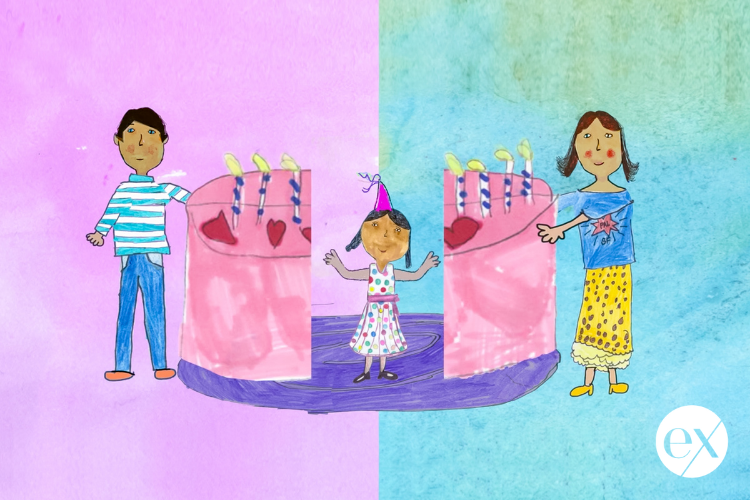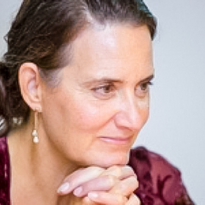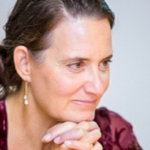
How do you talk about your divorce with your kids? What can you do to help them work through it? Ellen Bruno, filmmaker and creative mastermind behind the movie SPLIT and the sequel SPLIT UP: The Teen Years, along with Christina McGee, divorce parenting expert, author, and coach, joined T.H. and Jessica on the Divorce etc… podcast to discuss their films and how they benefit those in this exact situation.
Ellen and Christina’s Own Divorce Experiences
Ellen’s parents got divorced when she was 12 years old. As a family in a conservative Catholic town, divorce was a topic avoided at all costs. So she and her siblings were totally in the dark about what was going on. And what happens when a child is left in the dark?
“What happens when you don’t talk about frightening things is they become more frightening. And so they really became the monsters under the bed,” Ellen explains. So there she was at 12, trying to come up with an explanation for what was happening, and she concluded that she was dying, because what other explanation did she have for her parents pretending everything was fine?
Christina’s parents also divorced when she was young, like Ellen. But she was a teenager when they split up, so she had a very different experience. They weren’t talking about it, but they weren’t talking about it because they were keeping the past in the past and doing their best to move forward. So like a lot of kids, she navigated her parent’s divorce on her own.
Fast forward 30 years, when Ellen was going through her own divorce, and she realized that even after all this time, kids were still being kept out of the conversation. And thus the birth of their first film, SPLIT.
“The beauty of having a film to look at or share with children is you don’t need to dive into the child’s emotional reality right away,” Ellen explains. “They can look at another child’s experience and use that as a point of reference and as a way to begin the conversation.” This distance is a comfortable place for kids and their parents to begin that conversation and ease into the situation.
The Two Extremes
In Christina’s experience, parents tend to fall into two different extremes when talking about divorce with their kids. Either they under-talk and don’t share information to protect them, or they overexpose kids and give them too much information in an effort to be transparent. The bottom line is, how do we guide our children? How do we give them the appropriate amount of information and context for them to make sense of how their family is changing, to keep the conversation going without overwhelming them or keeping them in the dark? This is a difficult balance, and guidance, like in their films is helpful in navigating this balance.
Takeaways
For Christina, one of the more striking revelations was the struggle that kids have over trying to keep things balanced between parents behind the scenes. If you think your kids aren’t doing this, then you are kidding yourself. One of the girls in the film talks about how she views her time with her parents as a pie chart. She would see her time as 25% for one parent, 25% for the other, and the rest divvied up between her sister and other needs. A lot of times this stems from the way parents try to divide household time by 50/50, focusing on keeping it fair rather than keeping it flexible. Kids internalize this, and it can create a lot of anxiety.
Another important issue is how many kids wonder if the divorce was their fault, if they were made out of love, or if their parents really wanted them. How could they be wanted when their parents are constantly in conflict? It’s important to remind them that they were born at a time when their parents were in love. Let your kids have photos of both parents. Talk about the good times you shared as a family. Don’t let conversations like this become a taboo in the household. Don’t doubt the benefit of this conversation, and how healing it can be for the kids.
“When you don’t deal with your stuff, when you’re not processing it, when you’re not taking care of yourself, it just spills over onto your kids in so many ways,” Christina says – and she’s seen it a lot of times. The sequel of their film highlights this issue, as you can clearly see the kids who have parents that haven’t ever made peace with the past. These kids are still carrying around that burden of the past.
“If you don’t like your co-parent, where you can’t think of a good positive thing to say, then focus on how your children see that other parent,” Christina suggests. “Reinforce their positive experiences.” If your solution is to just go quiet when they mention the other parent, in order to stop yourself from saying anything negative, your kids will pick up on those subtle signals.
And it’s okay if you can’t hold it together for your kids 100% of the time. Trust us, it’s hard. You can’t always control your body language. But just take ownership of it when you can. There’s no such thing as a perfect parent. Nobody handles divorce perfectly. But that’s why we at exEXPERTS are here, and that’s why people like Ellen and Christina made their movies.
Powerful Moments in the Film
The movie has so many moments that bring the audience to tears or hit you right in the heart. Like in the case of one kid, you could tell the divorce was really hitting him hard. Seeing how much his mother hated his father, on top of the fact that he’s the spitting image of his father…there are moments like this in the film that just hit you full force.
There was another powerful moment where one young woman talked about her place at the table. She would always sit at the same seat when her family was together, but this changed when his dad got remarried and another child of the woman he married took over that seat at the table. Seemingly small, but enough that it shifted her balance in the family to a point where it remained prominent in her eyes.
It’s so easy to skim over stuff like this as parents without realizing the full impact it makes on our kids. It can make a lot of kids feel displaced when even the little things change. And while you don’t want to beat yourself up as a parent, keep in mind that this is why we need these types of conversations, films, and podcasts, where we acknowledge things that don’t typically pop up on our radar. “It’s like opening our scope of vision a little bit more broadly so that we can see our children’s experience,” Christina says.
Collaborating with the Kids
The great thing about SPLIT and SPLIT UP: The Teen Years is that Ellen and Christina worked to collaborate with the kids and invite them into the filmmaking process. For a lot of them, this was their opportunity to have a voice, to share what could help other kids going through similar experiences. And this was also the first time some of them really had the opportunity to have this kind of conversation. “The deal I made with them and the parents is, we’re going to have this conversation, the parents are not going to be present, and that was the ground rule,” Ellen explains. This allowed the kids to be as open as they pleased, and then decide later on if they were okay with those clips being used in the final cut of the film.
And Christina and Ellen say the kids felt real pride in participating in these films. In fact, 11 of the 12 original kids ended up participating in the sequel. It was so gratifying for them to see how many kids and families they had helped with their film by sharing their experiences. It brought these kids together, not just because they shared similar experiences, but because the film made them a family.
SPLIT UP: The Teen Years
The film is incredibly moving and allows parents to open that dialogue with their own children. Christina and Ellen actually suggest that parents watch for the first time without their children, so that they can feel emotional and not distract their children. The filmmakers think it’s important to watch and process the films before talking to kids so that they don’t get caught up in the process. And to help parents, even more, they’ve even created a workbook and dives into different parts of the film as a way to connect with your kids.
Leave a Comment
You must be logged in to post a comment.












